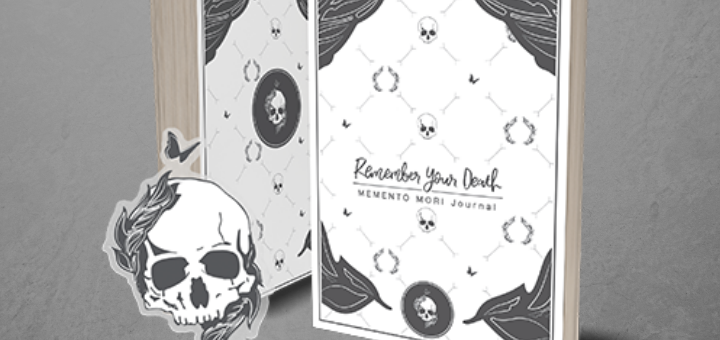
An interview with Sr Theresa Aletheia, fsp, about her new Memento Mori Journal and how the devotion of memento mori has been revived for our time.
 Courtesy of Pauline Books & Media. All rights reserved. Used with permission.[/caption]
What is memento mori?
Courtesy of Pauline Books & Media. All rights reserved. Used with permission.[/caption]
What is memento mori?
 Courtesy of Pauline Books & Media. All rights reserved. Used with permission.[/caption]
What would you like to say about how the new Memento Mori Journal can foster our spiritual growth?
Courtesy of Pauline Books & Media. All rights reserved. Used with permission.[/caption]
What would you like to say about how the new Memento Mori Journal can foster our spiritual growth?
Copyright 2018 St. Margaret Kerry, fsp
 Courtesy of Pauline Books & Media. All rights reserved. Used with permission.[/caption]
What is memento mori?
Courtesy of Pauline Books & Media. All rights reserved. Used with permission.[/caption]
What is memento mori?
Memento mori, meaning “Remember your death,” was a Christian practice popular in medieval times. But remembering one’s death in order to live well is an ancient tradition that stretches back for millennia, to before the coming of Christ. The Book of Sirach urges, “In whatever you do, remember your last days, and you will never sin” (7:38). In the New Testament, Jesus exhorted his disciples to carry their cross daily (see Lk 9:23) which is another way of saying "Remember your death." The Rule of Saint Benedict, written for monks in the 6th century, includes the imperative to “keep death daily before one’s eyes." Stoic philosophers also speak of the importance of remembering death in order to live well. There is a long non-Christian and Christian tradition of the value of remembering one’s death. The practice can be valuable for non-Christians as well but for Christians, it is entirely different. For us, death is illuminated by the life, death, and resurrection of Jesus Christ. Remembering death is more about remembering that Christ has saved us from the death of sin.When did you first discover memento mori?
Bl. James Alberione, the founder of the Daughters of Saint Paul, kept a skull on his desk as a memento mori to remind him of his death. Before I entered the Daughters of Saint Paul I read this and I thought, "That is so metal. Definitely going to do that at some point." Then I forgot about it. But the idea kept coming back to me. Last summer, while I was on my annual 8-day silent retreat, I was struggling with the problem of suffering, especially death. One of the priests who came to the retreat to give spiritual direction just happened to bring a skull with him (which is unusual; this is not a widespread practice). So I took that as a sign that I should act upon my desire to get a skull for my desk. Another sister kindly donated a ceramic skull to me from her Halloween supplies and the journey began. The first day, I thought, "How am I going to make sure I actually meditate on death?" So I decided to tweet about it. I tweeted “Day 1 with a skull on my desk” and then a random thought with the hashtag #mementomori, Latin for "remember your death." I thought nothing of it and figured I would do it for two weeks at most. But I received a huge response, so I decided I would continue for a while. People started buying skulls for their desks and meditating on death. Some people told me that they returned to church after seeing my tweets and thinking about their death. I never imagined that one tweet would turn into a movement but God always has interesting plans.How has this inspired your everyday life?
It would not be an exaggeration to say that the practice of memento mori has changed my life. I feel less fear of death. I think about death in a more Christian way. I more effortlessly put my life in an eschatological context than I did before. And I am more motivated to ask God for the grace to change for the better now rather than waiting for some indeterminate time in the future. We all think we will live until old age, but death could come at any time. Holiness becomes more urgent in view of the fact that death is both inevitable and unpredictable.Do you feel that the practice is to be treated as a serious dour practice or does a light-hearted approach to memento mori, remembering our death, helps us to remember our resurrection as well?
Memento mori in the Christian tradition is never dour. Even for those outside of the Christian tradition, meditation on death can be an encouraging and hopeful practice. But it is even more so for Christians. As Christians we are not just meditating on the reality of death but on Christ’s victory over death. In On the Incarnation, Saint Athanasius describes the disciples of Christ as those who “despise death.” We can only despise death and realize what Christ has done for us by way of meditating on death. Death has been conquered by Christ. In light of this reality, meditation on death becomes a hope-filled practice. Memento mori helps us to make a journey from fear to hope.
 Courtesy of Pauline Books & Media. All rights reserved. Used with permission.[/caption]
What would you like to say about how the new Memento Mori Journal can foster our spiritual growth?
Courtesy of Pauline Books & Media. All rights reserved. Used with permission.[/caption]
What would you like to say about how the new Memento Mori Journal can foster our spiritual growth?
The idea for both projects, Remember Your Death: Memento Mori Journal and Remember Your Death: Memento Mori Lenten Devotional that is coming out in January of 2019, evolved out of my own journey of remembering my death. I wanted to help people to incorporate what can be a powerful spiritual practice into their lives with something more substantive than my tweets. I thought it might help people to remember death if they had a journal to write in with an introduction to memento mori, quotes, and an appendix of prayers. Each lined page has a quote that is drawn from tweets as well as quotes from the saints, Church Fathers, and Scripture. The journal is meant to be used as a companion to the Lenten devotional, which contains journaling prompts. But it can also be used by itself by anyone who likes to journal. People have responded to the journal with a lot of excitement and determination to try this age-old practice themselves. I am excited for people to get their hands on the Lenten devotional because it is structured in such a way that helps people to meditate on death daily throughout Lent. I think people will find the daily reflections helpful to integrate this practice into their lives and see concrete, powerful results.Where do you find joy in this practice? Compare it to spiritual practices such as Practice of the Presence of God or Sacrament of the Present Moment.
Memento mori is a practice that leads to hope and joy because it can help us to live in the present moment. Some people tell me that they do not want to meditate on death because they don’t want to think of the future. They tell me that they’d rather enjoy life now. However, this is precisely what memento mori can help us to do. We cannot truly live in the moment or even know what it means to live unless we have meditated on death. Reminders of death are not meant to be a frightful thing, they motivate us to live for heaven now instead of planning for later. Reminding ourselves that death could come at any moment can help us to live our lives in the hope-filled context of eternity.https://youtu.be/RVHI9HSJsiE
Visit our Book Notes archive.
Copyright 2018 St. Margaret Kerry, fsp
About the Author

Sr. Margaret Kerry, fsp
A Daughter of St. Paul for 40 years Sr. Margaret continues to pursue new ways to proclaim the Gospel: sharing the Pauline Charism with the laity, writing books (St. Anthony of Padua: Fire & Light; Strength in Darkness: John of the Cross; Prayers for the New Evangelization), & through direct evangelization. She is available for workshops on the Vocation & Mission of the Laity, Media Literacy, and The New Evangelization. mkerry@paulinemedia.com


.png?width=1806&height=731&name=CatholicMom_hcfm_logo1_pos_871c_2728c%20(002).png)
Comments